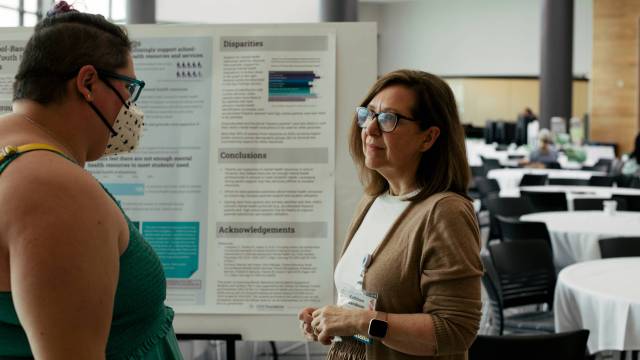You are here
Mental Health Awareness Month: Supporting Families, Supporting Students
May is Mental Health Awareness Month, and as the school year winds down, it is important to check in with our kids about their emotional health and wellbeing and get a better understanding of how we can support them both at home and in school.
Recent studies show that an increasing number of students are experiencing poor mental health. According to the Centers for Disease Control and Prevention’s (CDC’s) Youth Risk Behavior Survey (2021), more than 4 in 10 (42%) high school students felt persistently sad or hopeless and nearly one-third (29%) reported poor mental health.
Schools can play a critical role in supporting students who struggle with mental health challenges. They are more than a place of education and learning for our youth; schools provide opportunities to connect with friends, engage in physical activity and learn new life skills. When a student feels a strong sense of belonging and support at school, they are more likely to care about their academic success, form strong social connections at home and school and are less likely to report feelings of stress and anxiety or engage in harmful behaviors.
Cultivating a positive school environment requires a collective effort between educators, families and communities. In 2021, the CDC Foundation partnered with the Centers for Disease Control and Prevention (CDC)’s Division of Adolescent and School Health to support youth mental health and well-being through family engagement.
Through this work, we wanted to hear directly from parents and caregivers on a wide range of topics related to their child’s wellbeing in and out of school. Partnering previously with the National Parent Teacher Association, and currently with Action for Healthy Kids, the CDC Foundation conducted a series of online surveys and focus group discussions to better understand the concerns of caregivers and the kind of resources they need to support their child’s mental health.
In the most recent survey, conducted in December 2023, we asked more than 1,000 parents and caregivers of school-aged children what worries them most about their child’s well-being, what they see as their school’s role in providing resources and services to support youth mental health and their perspectives on what a safe and supportive school environment looks like. The results showed that parents and caregivers overwhelmingly support the idea of schools providing resources for their child’s emotional and mental health and programs that promote diversity and inclusion. It also highlighted that parents worry about their child’s physical safety at school, their mental health and time spent on electronic devices–a recurring concern from previous years.
Co-author Kathleen Jacobson, MPH, senior program officer at the CDC Foundation, recently traveled to the 2023 American Public Health Association Annual Meeting and the Adolescent Health Initiative Conference at the University of Michigan in Ann Arbor to meet with other public health practitioners, researchers and clinicians working to support adolescent health and share key findings from this research.
Digital media can also have a significant effect on the mental health of our children. Kids are constantly flooded with information online, and it can be difficult for them to figure out what is accurate and how to respond. The CDC Foundation partnered with the Public Good Projects during the 2022-2023 academic year to promote safe and supportive learning environments for students and provide guidance on how to safely and confidently navigate online platforms through improved media literacy skills for parents. When children see their parents taking the time to think more deeply and evaluate information, they are more likely to develop the same skills. With greater media literacy skills, parents can also recognize and address online threats effectively and guide their children in navigating the digital world safely and responsibly.
“By providing parents and caregivers with free resources, they can acquire the knowledge and skills necessary to create a nurturing environment that promotes positive mental health for their children,” said Catherine Zilber, Vice President for Infectious Disease Programs at the CDC Foundation.
We must continue to respond to the needs and concerns of caregivers and create strong partnerships between parents, schools and the community. Together we can create safe and supportive learning environments where every child feels valued and welcome, laying a foundation for their success and well-being in school and beyond.
---
For additional information about our work, visit our website.
To explore data from previous survey waves, use this interactive dashboard.
---
This story is supported by the Centers for Disease Control and Prevention (CDC) of the U.S. Department of Health and Human Services (HHS) as part of a financial assistance award totaling $1,939,999 with 100 percent funded by CDC/HHS. The contents are those of the author(s) and do not necessarily represent the official views of, nor an endorsement by, CDC/HHS, or the U.S. Government.


